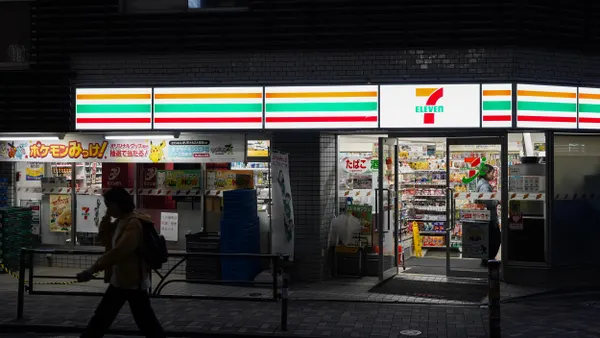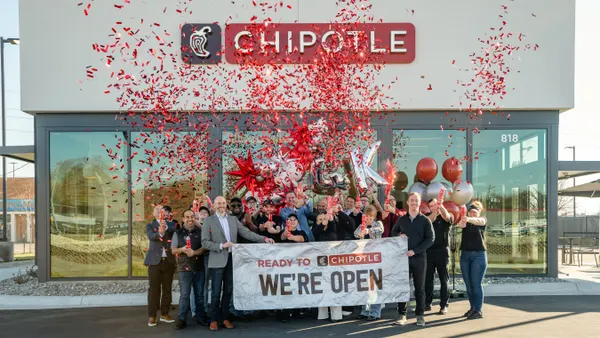Dive Brief:
- Activist investor Starboard Value LP is investing $200 million in Papa John's and the firm's CEO, Jeffrey Smith, will become chairman of the beleaguered pizza chain, according to a company release. Papa John's president and CEO Steve Ritchie also has been appointed to the board along with Anthony Sanfilippo, former chairman and CEO of Pinnacle Entertainment, who will serve as an independent director. The board is now made up of nine directors, including seven independents.
- The Papa John's board gave the Starboard deal the green light Sunday night, the Wall Street Journal reports. Founder and former CEO John Schnatter — who is a board member and also the company's largest shareholder — voted against the motion.
- The restaurant will use about half of Starboard's investment to settle debt and half to invest in the company. Starboard is making its investment by buying convertible preferred stock, making up a stake of between 11% and 15% of Papa John's outstanding common stock on an as-converted basis. Franchisees can buy $10 million of the stock under the same terms, and the firm can make an additional $50 million investment before March 29.
Dive Insight:
Papa John's deal with Starboard comes just a few days after Reuters reported that the restaurant's attempts to go private had fallen short of its valuation expectations, and that it was seeking a private investor instead. Shares of the pizza chain surged 11% in premarket trading on the news of the Starboard investment, according to Bloomberg.
The deal could bring the struggling pizza chain much-needed stability after a tumultuous year, which included Schnatter's ouster from the company after he used a racial slur on a company conference call.
"We believe we have found terrific partners to advance Papa John's strategy, especially given their record of reinvigorating and growing premier restaurant and consumer brand companies,” Olivia Kirtley, a member of Papa John's special committee and former chairman of the board, said of Starboard in a company release.
In 2014, Starboard replaced the 12-member board of Oliver Garden parent company Darden Restaurants with its own selections in an unusual shareholder coup. The firm, which at one point had a 9% stake in Darden, then enacted several changes at Olive Garden — including cost cutting, improving the chain's famous breadsticks, serving more alcohol and adding tabletop ordering and payment tablets — that helped get the restaurant back on track. Eighteen months after the takeover, the WSJ reported that Olive Garden's stock had jumped 47% and year-over-year sales had increased for six consecutive quarters.
It seems that the firm will take a different approach with Papa John's, however. The WSJ reports that Starboard is more interested in opportunities to invest in the brand than to reduce costs.
That strategy would make sense, as the company clearly needs a financial boost. The pizza space is plenty crowded, so Papa John's eroding market share could easily be filled by another player or more as it works to free itself of Schnatter's ongoing drama.
Since stepping down as chairman in July, Schnatter has launched his own website (savepapajohns.com), blamed CEO Steve Ritchie for the company's poor performance, hired financial advisers to consider potential alternatives for increasing shareholder value, and won a court case forcing the company to hand over documents that he claims prove he was improperly pushed out. That's a lot of baggage for a private equity firm to take on.
The company's efforts to distance itself from its former CEO have been costly, without inciting much of a turnaround. According to CNBC, the company spent $3.6 million just to scrub Schnatter's image from its marketing materials and $9.9 million to assist its franchisees by reducing royalty fees and contributing to store remodeling. Papa John's expects to tack on between $25 million and $35 million in Q4 to continue these recovery efforts.
Recent analysis from Longbow indicates that Domino’s has gained market share from Papa John’s during this time. Pizza Hut could also very well make a dent here eventually with its first NFL season under its belt.
The North American pizza market is predicted to grow 10% in the next five years. Papa John's Q4 results don't reflect this growth, however, with comparable sales declining 8.1% during the quarter and 7.3% for the year in North America. The first quarter of the year also hasn't been shaping up well. During January, sales decreased 10.5% in North America, according to a press release. The company says sales in December and January were impacted by the switchover to a new loyalty program and ineffective promotions within a highly competitive environment, areas Starboard will need to focus on improving in the coming months.










